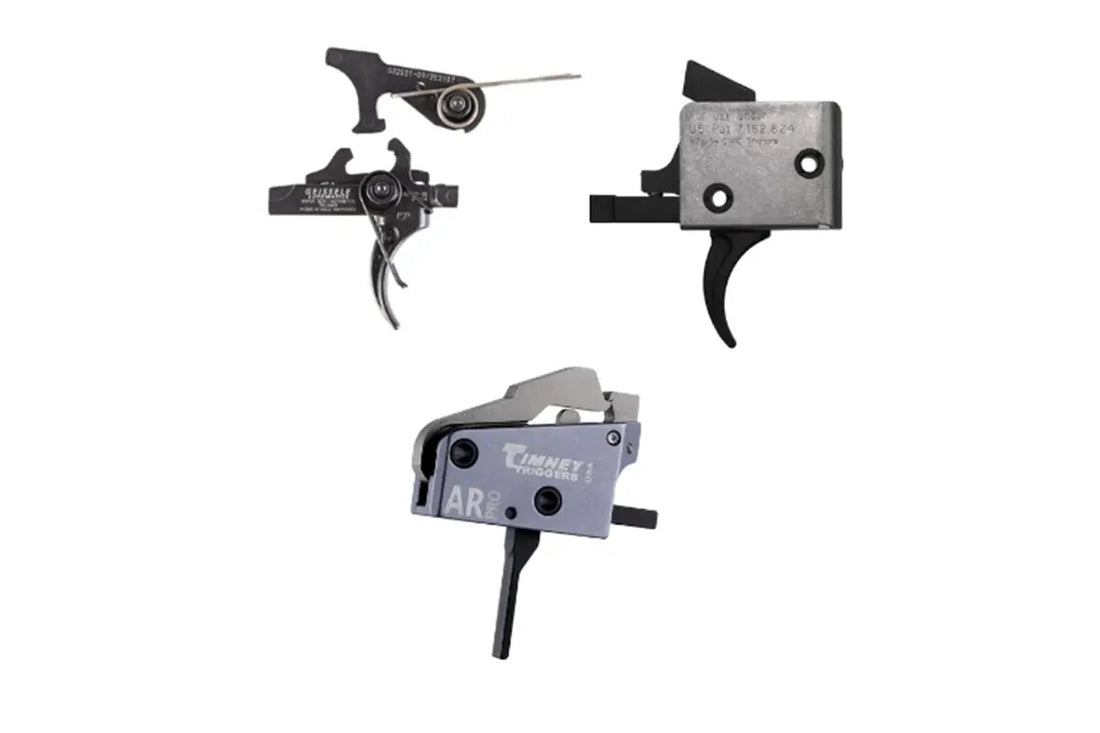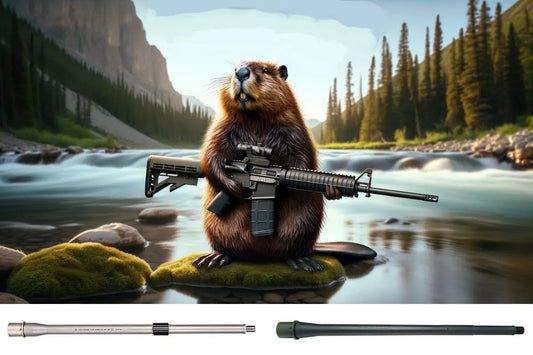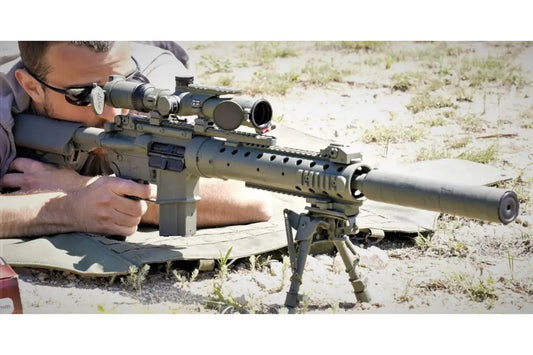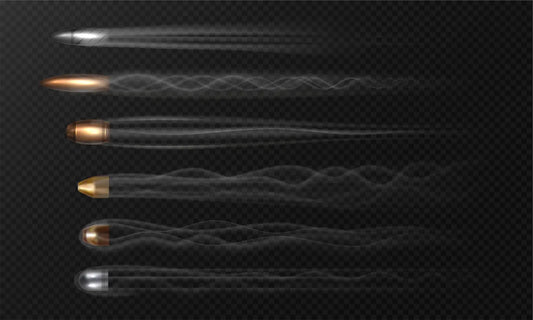
Single-Stage vs. Two-Stage Triggers for Your AR-15: Which Is Right for You?
🔍 Summary Table: Quick Comparison
|
Feature |
Single-Stage Trigger |
Two-Stage Trigger |
|
Pull Feel |
One consistent motion |
Two distinct stages: light take-up + break |
|
Use Case |
Home defense, tactical shooting |
Precision shooting, long-range, competition |
|
Reset |
Short, crisp reset |
Usually slightly longer reset |
|
Trigger Weight |
Typically 3.5–6.5 lbs |
First stage ~2 lbs; Second stage 1.5–3 lbs |
|
Best For |
Speed and simplicity |
Accuracy and control |
|
Top Picks |
Geissele SSA-E, Timney Competition |
Geissele SSA, LaRue MBT-2S |
|
Price Range |
$70–$250 |
$90–$300 |
TL;DR for Skimmers
If you prioritize speed and simplicity (e.g., home defense or CQB), go with a single-stage trigger. If you value precision and control (e.g., long-range or competition), invest in a two-stage trigger. For most shooters, a high-quality two-stage trigger like the Geissele SSA-E offers the best blend of control and speed.
🎯 Introduction: Why the Trigger Matters
When customizing your AR-15, few upgrades will impact your shooting as dramatically as the trigger. It’s the literal interface between your mind and the bullet—where intent becomes action.
The debate between single-stage and two-stage triggers is not just about preference; it's about application. In this article, we'll break down the pros and cons of each, recommend the best-in-class products, and help you choose the ideal option based on your real-world use case.
🔧 What’s the Real Difference Between Single-Stage and Two-Stage Triggers?
✅ Single-Stage Triggers
A single-stage trigger delivers a clean, uninterrupted pull until the break. Think of it like a light switch: pull, break, fire.
- Mechanism: One continuous motion without any take-up or slack.
- Feel: Crisp and immediate.
- Weight: Commonly available from 3 to 6.5 lbs.
Use Cases:
- Home/self-defense
- Close-quarters battle (CQB)
- Run-and-gun training
- Basic range use
"A good single-stage trigger lets you break shots quickly and cleanly. For dynamic shooting, you don’t want to think too much—just shoot."
— John Lovell, Warrior Poet Society
✅ Two-Stage Triggers
A two-stage trigger breaks the pull into two parts: a light initial take-up, followed by a clean, defined break.
- Stage One: Light resistance (~1.5–2.5 lbs)
- Stage Two: Crisp break (~1.5–3 lbs)
- Total Pull: Typically, 3–5 lbs combined
Use Cases:
- Precision/long-range shooting
- Competition (3-Gun, DMR, PRS)
- Hunting
- Tactical scenarios demanding control
"The two-stage design gives you the opportunity to prepare mentally before the break. That’s essential in precision environments."
— Bill Geissele, Founder of Geissele Automatics
🔎 Deep Dive: Pros & Cons
🔥 Single-Stage Triggers
✅ Pros:
- Fast, consistent break—ideal for high-speed shooting
- Fewer moving parts, typically more robust
- Great for beginners and home defense
- Easier to "slap" in high-stress scenarios
❌ Cons:
- Less fine control under stress
- Easier to negligently discharge under adrenaline
- Not ideal for precise shot placement
🧠 Two-Stage Triggers
✅ Pros:
- Increased control over the shot
- Easier to prep for precision fire
- Generally preferred by marksmen and snipers
- Reduces flinching; mental preparation before break
❌ Cons:
- Slightly more complex design
- Marginally longer reset time
- Can confuse some new shooters (misinterpret 1st stage as mushy)
🏆 Top Recommended Triggers in Each Category
🔩 Best Single-Stage Triggers
1. Timney AR-15 Competition Trigger (Single-Stage)
- Pull Weight: 3 or 4 lbs options
- Type: Drop-in cassette
- Material: EDM machined from A2 tool steel
- Price: ~$250
- Why it’s great:
- Extremely clean break
- No take-up at all
- Zero creep and ultra-reliable
2. CMC Triggers AR-15 Single Stage Flat Trigger
- Pull Weight: 3.5 lbs
- Type: Drop-in
- Price: ~$170
- Why it’s great:
- Flat-face for uniform finger placement
- Excellent value
- Minimal pre-travel and over-travel
⚙️ Best Two-Stage Triggers
1. Geissele SSA-E (Super Semi-Automatic Enhanced)
- First Stage: 2.3 lbs
- Second Stage: 1.2 lbs
- Total Pull: ~3.5 lbs
- Why it’s elite:
- Designed for designated marksman rifles (DMRs)
- Ultra-precise break
- Used by military Tier 1 units
2. LaRue Tactical MBT-2S (Two-Stage)
- First Stage: ~2.5 lbs
- Second Stage: ~2 lbs
- Price: ~$99 (best value in category)
- Why it’s great:
- Steel-on-steel contact
- No grit, creep, or slop
- Feels like a $250 trigger for under $100
3. ALG Defense ACT Trigger (Enhanced Mil-Spec)
- Type: Technically a single-stage, but with cleaner feel
- Pull: 5.5 lbs (very smooth)
- Why it’s notable:
- Affordable upgrade over mil-spec
- Nickle-boron coated surfaces reduce friction
- Great choice if you're on a tight budget
🧪 Application Scenarios: What Kind of Shooter Are You?
🛡 Home Defender or Tactical Operator?
Go single-stage. The clean, no-nonsense break is ideal for high-adrenaline, close-range environments. Speed matters more than finesse.
Best Pick: Timney AR-15 Competition
🏞 Hunter or Long-Range Enthusiast?
Choose a two-stage trigger. When you’re lining up that shot at 300+ yards, the prep-and-break control is indispensable.
Best Pick: Geissele SSA-E
🥇 Competitive Shooter (3-Gun, PRS)?
Precision and split-second timing are everything. Two-stage triggers give you more deliberate shot execution without sacrificing speed when mastered.
Best Pick: LaRue MBT-2S (best value) or Geissele SSA-E (ultimate performance)
💰 Budget-Conscious Builder?
If you're building out your AR on a budget but want a serious performance upgrade over stock, go with the ALG ACT or CMC Single-Stage.
Best Pick: ALG ACT for sub-$100 budget; CMC if you can stretch to $150–$170.
⚙️ How to Install Your New Trigger (Brief Overview)
Installing an aftermarket AR-15 trigger is usually a 30-minute DIY job with basic tools:
- Unload your rifle – Safety first.
- Disassemble lower – Remove takedown pins and trigger group.
- Drop-in trigger – Most modern triggers are “cassette style.”
- Secure pins – Use anti-walk pins or supplied pins.
- Function test – Check reset, break, and safety engagement.
🔧 Pro Tip: If you’re unsure, have a gunsmith do the install. Trigger work is not the place to mess up.
📊 Final Verdict: Which Should YOU Choose?
If you want:
- Speed and simplicity → go single-stage
- Precision and control → choose two-stage
- Best of both worlds → look into hybrid tuned two-stage models like the SSA-E
"In a home defense scenario, your brain is running fast—sometimes a single-stage trigger just works better under pressure. But for every other shooting discipline, two-stage triggers offer tangible advantages."
— Mike Seeklander, Pro Shooter, Former Federal Air Marshal
🛒 Where to Buy High-Quality AR-15 Triggers
👉 Click here to shop for the best AR-15 triggers
🧠 Expert Takeaways
- Don’t skimp on the trigger—this is where your rifle earns its edge.
- Match the trigger style to your use case, not what others prefer.
- High-end triggers like Geissele and LaRue offer tangible performance gains.
- If you're torn, err on the side of control: two-stage triggers offer more versatility.




